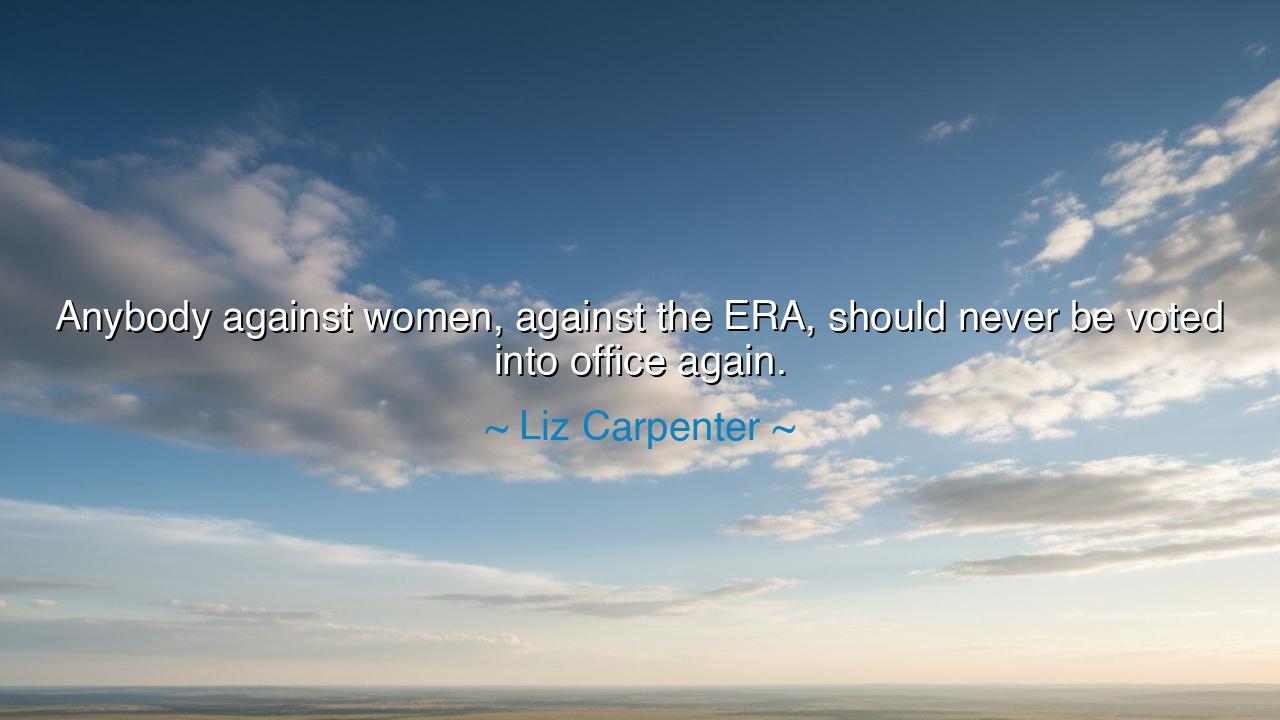
Anybody against women, against the ERA, should never be voted






The words of Liz Carpenter — “Anybody against women, against the ERA, should never be voted into office again” — thunder like the voice of justice itself, calling forth accountability from the halls of power. Here she proclaims that those who deny equality to women are unworthy to govern, for their rule is not service but oppression. To resist the ERA, the Equal Rights Amendment, was to resist the recognition of women as full citizens under the law. Carpenter’s words demand that the people wield their greatest weapon — the vote — not for those who chain progress, but for those who break the chains.
This saying was born in the midst of America’s struggle for gender equality in the 1970s. The ERA, simple in its promise, declared that rights under the law shall not be denied on account of sex. Yet even such a clear and just amendment faced bitter resistance from those who clung to old hierarchies. Carpenter, a writer, activist, and speechwriter for Lady Bird Johnson, lifted her voice like a sword, reminding all that politics is not a game of parties but a battlefield of principles. To vote for opponents of the ERA, she warned, was to betray justice itself.
History bears witness to the truth of her words. When Abraham Lincoln declared that a nation could not endure half slave and half free, he too proclaimed that certain positions are unworthy of leadership. To stand against equality is not merely to hold a different opinion, but to deny the humanity of others. So too with Carpenter’s words: to oppose women’s rights is to show oneself unfit for the sacred trust of office.
Her declaration also teaches that progress is not only won in courts and legislatures, but in the choices of the people. Every ballot cast is a judgment of conscience, a chance to decide whether power shall be given to those who uplift or to those who oppress. By tying the fate of the ERA to the duty of voters, Carpenter placed responsibility in the hands of the people, urging them to guard the gates of democracy with vigilance.
Let future generations remember: those who deny equality for women deny equality for all. No nation can rise when half its people are held down. Carpenter’s words are a torch, reminding us that leadership is a sacred trust, and those who stand against justice must not be allowed to wield it. For to give them power is to betray not only women, but the very soul of freedom itself.






HHHoang Hieu
Liz Carpenter’s quote really struck me, and it’s easy to understand why it would inspire a strong reaction. But I wonder—what do we do with people who are in positions of power, but oppose the ERA because of deeply held ideological beliefs? Is it right to demand that they be removed from office if their other policies support women's advancement? I feel like we need to better understand the 'why' behind the opposition to fully evaluate whether someone should be disqualified.
SNsha nttn
I can't help but feel conflicted about the line in Liz Carpenter's quote. On one hand, advocating for women's equality is incredibly important, but on the other hand, should we be so quick to label someone as unfit for office based solely on their stance on the ERA? Aren’t there more complex issues at play when choosing a leader? It’s a bit of a black-and-white statement, and I think we need more gray areas to fully understand political stances.
TPphan thi phuong
The quote is powerful, but it also feels a bit like it’s asking for a strict, one-size-fits-all approach to voting. Is it fair to judge an entire political career on one stance? What about someone who opposes the ERA for reasons rooted in a broader worldview, like religious or philosophical beliefs? Shouldn't we engage in a more thoughtful dialogue about the pros and cons of such constitutional amendments before making definitive judgments about people's character?
HUDau Nu Hoang Uyen
While I agree with the sentiment of supporting women’s rights, I wonder whether the quote oversimplifies the issue. What if there are political leaders who oppose the ERA but still work hard to improve women’s lives in other ways? Can we really disqualify someone based solely on their stance on one issue? It would be interesting to explore the broader context of these leaders' policies before making such a sweeping statement.
TDTa Thuy Duong
Liz Carpenter's statement speaks to a clear sense of urgency and passion regarding women's rights and the Equal Rights Amendment. It makes me wonder, though, what does it mean for the political landscape when so many politicians seem resistant to advancing women’s equality? Is it fair to suggest that any opposition to the ERA is inherently harmful to society, or are there legitimate concerns that need to be addressed? I feel like the conversation around gender equality needs to be much more nuanced than this simple divide.